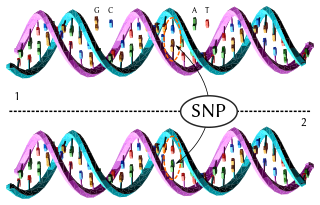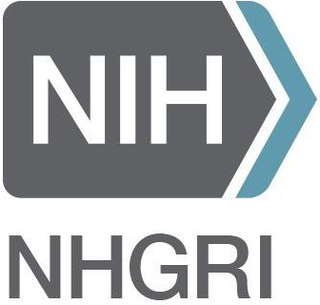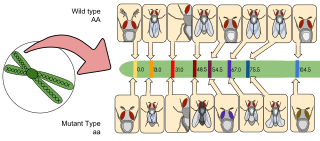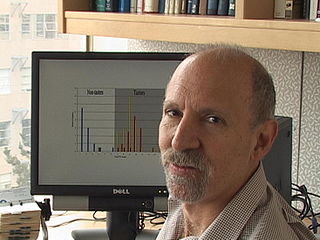
In genetics, a single-nucleotide polymorphism is a germline substitution of a single nucleotide at a specific position in the genome. Although certain definitions require the substitution to be present in a sufficiently large fraction of the population, many publications do not apply such a frequency threshold.

The National Human Genome Research Institute (NHGRI) is an institute of the National Institutes of Health, located in Bethesda, Maryland.

A DNA segment is identical by state (IBS) in two or more individuals if they have identical nucleotide sequences in this segment. An IBS segment is identical by descent (IBD) in two or more individuals if they have inherited it from a common ancestor without recombination, that is, the segment has the same ancestral origin in these individuals. DNA segments that are IBD are IBS per definition, but segments that are not IBD can still be IBS due to the same mutations in different individuals or recombinations that do not alter the segment.

Gene mapping describes the methods used to identify the locus of a gene and the distances between genes. Gene mapping can also describe the distances between different sites within a gene.

Medical genetics is the branch tics]] in that human genetics is a field of scientific research that may or may not apply to medicine, while medical genetics refers to the application of genetics to medical care. For example, research on the causes and inheritance of genetic disorders would be considered within both human genetics and medical genetics, while the diagnosis, management, and counselling people with genetic disorders would be considered part of medical genetics.

Neil Risch is an American human geneticist and professor at the University of California, San Francisco (UCSF). Risch is the Lamond Family Foundation Distinguished Professor in Human Genetics and Director of the Institute for Human Genetics and Professor of Epidemiology and Biostatistics at UCSF.

Human genetic variation is the genetic differences in and among populations. There may be multiple variants of any given gene in the human population (alleles), a situation called polymorphism.

The Human Genome Project (HGP) was an international scientific research project with the goal of determining the base pairs that make up human DNA, and of identifying, mapping and sequencing all of the genes of the human genome from both a physical and a functional standpoint. It started in 1990 and was completed in 2003. It remains the world's largest collaborative biological project. Planning started after the idea was picked up in 1984 by the US government, the project formally launched in 1990, and was declared essentially complete on April 14, 2003, but included only about 85% of the genome. Level "complete genome" was achieved in May 2021, with a remaining only 0.3% bases covered by potential issues. The final gapless assembly was finished in January 2022.
In molecular biology, SNP array is a type of DNA microarray which is used to detect polymorphisms within a population. A single nucleotide polymorphism (SNP), a variation at a single site in DNA, is the most frequent type of variation in the genome. Around 335 million SNPs have been identified in the human genome, 15 million of which are present at frequencies of 1% or higher across different populations worldwide.
Mouse Genome Informatics (MGI) is a free, online database and bioinformatics resource hosted by The Jackson Laboratory, with funding by the National Human Genome Research Institute (NHGRI), the National Cancer Institute (NCI), and the Eunice Kennedy Shriver National Institute of Child Health and Human Development (NICHD). MGI provides access to data on the genetics, genomics and biology of the laboratory mouse to facilitate the study of human health and disease. The database integrates multiple projects, with the two largest contributions coming from the Mouse Genome Database and Mouse Gene Expression Database (GXD). As of 2018, MGI contains data curated from over 230,000 publications.

The 1000 Genomes Project, launched in January 2008, was an international research effort to establish by far the most detailed catalogue of human genetic variation. Scientists planned to sequence the genomes of at least one thousand anonymous participants from a number of different ethnic groups within the following three years, using newly developed technologies which were faster and less expensive. In 2010, the project finished its pilot phase, which was described in detail in a publication in the journal Nature. In 2012, the sequencing of 1092 genomes was announced in a Nature publication. In 2015, two papers in Nature reported results and the completion of the project and opportunities for future research.

Aravinda Chakravarti is a human geneticist and expert in computational biology, and Director of the Center For Human Genetics & Genomics at New York University. He was the 2008 President of the American Society of Human Genetics. Chakravarti became a co-Editor-in-Chief of the journal Genome Research in 1995, and of the Annual Review of Genomics and Human Genetics' in 2005.
Helen Donis-Keller is the Michael E. Moody Professor and Professor of Biology and Art at Olin College of Engineering in Needham, Massachusetts.

Newton Ennis Morton was an American population geneticist and one of the founders of the field of genetic epidemiology.

Elaine Ann Ostrander is an American geneticist at the National Human Genome Research Institute (NHGRI) of the National Institutes of Health (NIH) in Bethesda, Maryland. She holds a number of professional academic appointments, currently serving as Distinguished and Senior Investigator and head of the NHGRI Section of Comparative Genomics; and Chief of the Cancer Genetics and Comparative Genomics Branch. She is known for her research on prostate cancer susceptibility in humans and for conducting genetic investigations with the Canis familiaris —the domestic dog— model, which she has used to study disease susceptibility and frequency and other aspects of natural variation across mammals. In 2007, her laboratory showed that much of the variation in body size of domestic dogs is due to sequence changes in a single gene encoding a growth-promoting protein.

Charles Nohuoma Rotimi is the Director of the Trans-National Institutes of Health (NIH) center for research in genomics and global health. He works to ensure that population genetics include genomes from African populations and founded the African Society of Human Genetics in 2003. Rotimi was instrumental in the launch of the Human Heredity and Health in Africa (H3Africa) with the NIH and the Wellcome Trust. He was elected to the National Academy of Medicine in 2018.
Charmaine DM Royal is an American geneticist and Associate Professor at the Institute for Genome Sciences & Policy and the Department of African and African American Studies at Duke University. She studies the intersections of race, ethnicity, ancestry genetics, and health, especially as they pertain to historically marginalized and underrepresented groups in genetic and genomic research; and genomics and global health. Her major interest is in addressing root causes and implementing sustainable solutions regarding problems of race and racism in research, healthcare, and society. Royal is a Human Heredity and Health in Africa (H3Africa) Independent Expert Committee (IEC) member appointed by the National Institutes of Health (NIH) and is a 2020 Ida Cordelia Beam Distinguished Visiting Professor at the University of Iowa.

Vence L. Bonham Jr., J.D. is the acting Deputy Director of the National Human Genome Research Institute (NHGRI) of the U. S. National Institutes of Health, and is the leader of the NHGRI Health Disparities Unit. His research focuses on social determinants of health, particularly with regard to the social implications of new genomic knowledge and technologies.
Krina Tynke Zondervan is a Dutch biomedical scientist who is a Professor of Genomic Epidemiology at the University of Oxford. She serves on the Board of the World Endometriosis Society.

Adebowale A. Adeyemo is a Nigerian physician-scientist and genetic epidemiologist specialized in genomics and cardiometabolic disorders. He is the deputy director and chief scientific officer of the Center for Research on Genomics and Global Health at the National Human Genome Research Institute.















